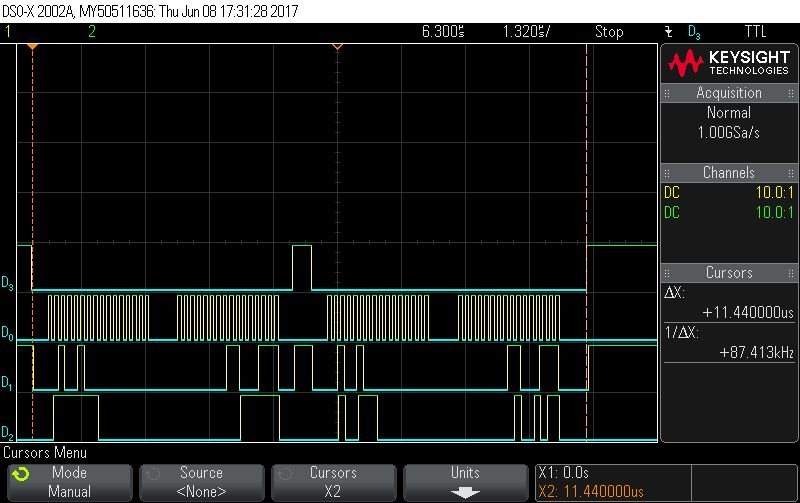Other Parts Discussed in Thread: STRIKE
Fellows,
Code below reads two continous sets of 32 bits over an SPI port, with CSB controlled by GPIO, and clock set at 7.5MHz. It takes 11.44us. Tivaware functions compiled to Flash, no optimizations.
IntMasterDisable();
GPIOPinWrite(gyroHW->GPIOFSSPort,gyroHW->GPIOFSSPin,0); // Lower CSB
SSIDataPut(gyroHW->SSIBase, frameHigh); // Sends only the upper 16 bits
while(SSIBusy(gyroHW->SSIBase)); // Flush first 16 bits
SSIDataGet(gyroHW->SSIBase, &readCrap); // Read useless data
SSIDataPut(gyroHW->SSIBase, (frameLow)); // This sends the other 16 bits
while(SSIBusy(gyroHW->SSIBase)); // Flush second 16 bits
GPIOPinWrite(gyroHW->GPIOFSSPort,gyroHW->GPIOFSSPin,gyroHW->GPIOFSSPin); // Raise CSB
SSIDataGet(gyroHW->SSIBase, &readCrap); // Read useless data
GPIOPinWrite(gyroHW->GPIOFSSPort,gyroHW->GPIOFSSPin,0); // Lower CSB
SSIDataPut(gyroHW->SSIBase, frameHigh); // Flush third 16 bits
while(SSIBusy(gyroHW->SSIBase)); // Wait for bits to be flushed out
SSIDataGet(gyroHW->SSIBase, &read16High); // Read 16 bits
SSIDataPut(gyroHW->SSIBase, frameLow); // Flush last 16 bits
while(SSIBusy(gyroHW->SSIBase)); // Wait for bits to be flushed out
SSIDataGet(gyroHW->SSIBase, &read16Low); // Read more data
GPIOPinWrite(gyroHW->GPIOFSSPort,gyroHW->GPIOFSSPin,gyroHW->GPIOFSSPin); // Raise CSB
IntMasterEnable();
While this exact version with all the API's called directly from ROM take 12.22us.
IntMasterDisable();
ROM_GPIOPinWrite(gyroHW->GPIOFSSPort,gyroHW->GPIOFSSPin,0); // Lower CSB
ROM_SSIDataPut(gyroHW->SSIBase, frameHigh); // Sends only the upper 16 bits
while(ROM_SSIBusy(gyroHW->SSIBase)); // Flush first 16 bits
ROM_SSIDataGet(gyroHW->SSIBase, &readCrap); // Read useless data
ROM_SSIDataPut(gyroHW->SSIBase, (frameLow)); // This sends the other 16 bits
while(ROM_SSIBusy(gyroHW->SSIBase)); // Flush second 16 bits
ROM_GPIOPinWrite(gyroHW->GPIOFSSPort,gyroHW->GPIOFSSPin,gyroHW->GPIOFSSPin); // Raise CSB
ROM_SSIDataGet(gyroHW->SSIBase, &readCrap); // Read useless data
ROM_GPIOPinWrite(gyroHW->GPIOFSSPort,gyroHW->GPIOFSSPin,0); // Lower CSB
ROM_SSIDataPut(gyroHW->SSIBase, frameHigh); // Flush third 16 bits
while(ROM_SSIBusy(gyroHW->SSIBase)); // Wait for bits to be flushed out
ROM_SSIDataGet(gyroHW->SSIBase, &read16High); // Read 16 bits
ROM_SSIDataPut(gyroHW->SSIBase, frameLow); // Flush last 16 bits
while(ROM_SSIBusy(gyroHW->SSIBase)); // Wait for bits to be flushed out
ROM_SSIDataGet(gyroHW->SSIBase, &read16Low); // Read more data
ROM_GPIOPinWrite(gyroHW->GPIOFSSPort,gyroHW->GPIOFSSPin,gyroHW->GPIOFSSPin); // Raise CSB
IntMasterEnable();
Not that this will kill anyone, but all discussions and documentations to date imply that ROM calls are faster. Any thoughts as the reason for the results above?
Regards
Bruno



